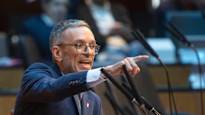The far-right Freedom Party has never before become the largest party. The government negotiations are expected to be difficult.
Roni Kuronen,
Simo Ortamo
18:13•Updated 19:30
The preliminary results of the Austrian parliamentary elections have been published.
According to the results, the far-right and pro-Russia Freedom Party (FPÖ) is becoming the largest party in the country with 29.3 percent of the vote.
The current ruling party, the center-right Austrian People’s Party (ÖVP), is coming second in the elections with a 25.3 percent vote share. The chairman of the party and the current chancellor Karl Nehammer has admitted defeat.
The Social Democratic Party (SPÖ) is finishing third in the elections. The party is getting 20 percent of the votes.
The election winner opposes supporting Ukraine
The Freedom Party has never become the largest party before. Its far-right leader Herbert Kickl has succeeded in exploiting the citizens’ widespread dissatisfaction with the current governing parties.
The party opposes sanctions against Russia and supporting Ukraine.
If the party gets into the government, it can make it difficult for the EU to make decisions on these issues. According to EU rules, all member countries must approve the new aid and sanctions packages.
The party also opposes immigration and the EU’s Green Deal climate agreement, and demands tougher measures on internal security. Party leader Kickl is known for his anti-Jewish and anti-Muslim views.
The Freedom Party has sat in the Austrian government twice before. This time, the government negotiations are expected to be difficult.
Of all the parties, only the people’s party ÖVP is generally open to going with the government’s Freedom Party. However, its chairman Nehammer has stated that the Freedom Party’s Kickl cannot become a minister.
So far, at least, the Freedom Party has given no indication that it would agree to the demand.
Sources: Reuters, AFP, AP
